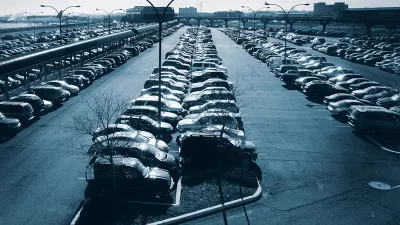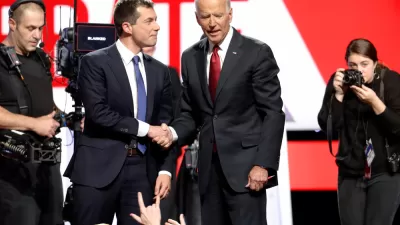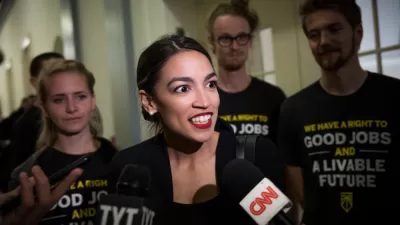With record amounts of gasoline burned by America's passenger vehicle fleet which is increasing composed of light trucks rather than cars, and with Americans driving record distances, The Washington Post argues it's time for a carbon tax.

"The Energy Department announced Aug. 31 that the country fueled up more this June than in any other month the agency has measured, underscoring a finding last month that the United States is on track to set an annual gas consumption record in 2016," reports The Washington Post editorial board.
[In 2014], government experts projected [in below graph] that gasoline use would bump up about now — but not that it would hit or breach its 2007 peak.
Source: U.S. Energy Information Administration, Annual Energy Outlook 2014 Reference case
So much for the June 26, 2014 projection. Gas prices began falling the next month, and then precipitously after the November OPEC meeting. This past Labor Day saw the lowest gas prices in 12 years.
2016 gasoline consumption projection:
On Sept. 7, the Federal Energy Information Administration forecasted total gas consumption this year is to increase 1.9 percent, "surpassing the previous record set in 2007," to a total of 9.33 million barrels/day.
As for vehicle miles traveled (VMT), which one could reasonably expect to correlate with gasoline consumption, the 2007 record set for vehicle-miles-traveled was already shattered last year, reported Planetizen blogger Steve Polzin in March. Last month the Federal Highway Administration announced that they expect VMT in 2016 will break last year's record.
"Americans are driving more and buying bigger vehicles," observe the editors.
The Environmental Protection Agency recently projected that people would buy more trucks and fewer gas-sipping cars in coming years than its experts had previously estimated. All of this is happening while one of the EPA’s marquee anti-climate-change policies, increasingly stiff fuel-efficiency requirements for cars and trucks, has been phasing in.
Furthermore, the combination of historically low gasoline prices and more fuel efficient vehicles, including light trucks that are now leaner than prior models, "might also encourage some people to drive more than they would have otherwise, because their gas bills are lower," the editorial suggests. This is known as known as the rebound effect or Jevon's Paradox.
While supportive of strengthening fuel economy standards, the editorial board would prefer a policy that addresses both fuel efficiency and vehicle miles traveled, and goes beyond transportation — the carbon tax, "the least expensive path to lowering the country’s carbon dioxide emissions," they assert.
[I]t would be better to establish a policy that encouraged individuals and businesses to account for the environmental impacts of driving, turning on the light switch, buying clothes or doing anything else that involves fossil fuels. This policy is a steadily rising carbon tax. A carbon tax would put a lower ceiling on national gasoline use without more aggressive regulatory interventions.
====================================
Analysis
To their credit, the editorial recognizes that in the current political environment, a carbon tax is unlikely, to put it lightly. Congress did come close to putting a price on carbon with cap-and-trade legislation when the House, on June 26, 2009, passed The American Clean Energy and Security Act of 2009, aka the "Waxman-Markey Bill, after its authors, Representatives Henry A. Waxman of California and Edward J. Markey of Massachusetts, both Democrats."
"Citing a lack of bipartisan support in the Senate, however, [then Senate Majority Leader Harry Reid (D-Nev.)] announced in July 2010 that upcoming energy legislation would not include a cap on GHG emissions," according to the Center for Climate and Energy Solutions. "This effectively ended action on climate legislation for the 111th Congress."
Why formulate a new tax when the gas tax largely does the same thing, albeit only in transportation?
Ironically, had President Obama and Democratic Senators agreed to a gas tax in 2010 instead of nixing the idea, climate legislation stood a more favorable chance of passing as it had the support of oil companies and Republican Senators who saw it as preferable to implementing a cap-and-trade program.
The editorial is helpful in that it indirectly play-up the merits of the gas tax:
- No arguing about whether climate change is a hoax, as one presidential candidate maintains.
- No debating where to spend the funds — federal law directs revenue to the Highway Trust Fund, with about 15 percent directed to public transportation.
- And both candidates and Congress support greater investment in transportation infrastructure.
The Washington Post suggests for further reading:
FULL STORY: With more people hitting the road, it’s time for a carbon tax

Alabama: Trump Terminates Settlements for Black Communities Harmed By Raw Sewage
Trump deemed the landmark civil rights agreement “illegal DEI and environmental justice policy.”

Planetizen Federal Action Tracker
A weekly monitor of how Trump’s orders and actions are impacting planners and planning in America.

Why Should We Subsidize Public Transportation?
Many public transit agencies face financial stress due to rising costs, declining fare revenue, and declining subsidies. Transit advocates must provide a strong business case for increasing public transit funding.

Understanding Road Diets
An explainer from Momentum highlights the advantages of reducing vehicle lanes in favor of more bike, transit, and pedestrian infrastructure.

New California Law Regulates Warehouse Pollution
A new law tightens building and emissions regulations for large distribution warehouses to mitigate air pollution and traffic in surrounding communities.

Phoenix Announces Opening Date for Light Rail Extension
The South Central extension will connect South Phoenix to downtown and other major hubs starting on June 7.
Urban Design for Planners 1: Software Tools
This six-course series explores essential urban design concepts using open source software and equips planners with the tools they need to participate fully in the urban design process.
Planning for Universal Design
Learn the tools for implementing Universal Design in planning regulations.
Caltrans
Smith Gee Studio
Institute for Housing and Urban Development Studies (IHS)
City of Grandview
Harvard GSD Executive Education
Toledo-Lucas County Plan Commissions
Salt Lake City
NYU Wagner Graduate School of Public Service





























